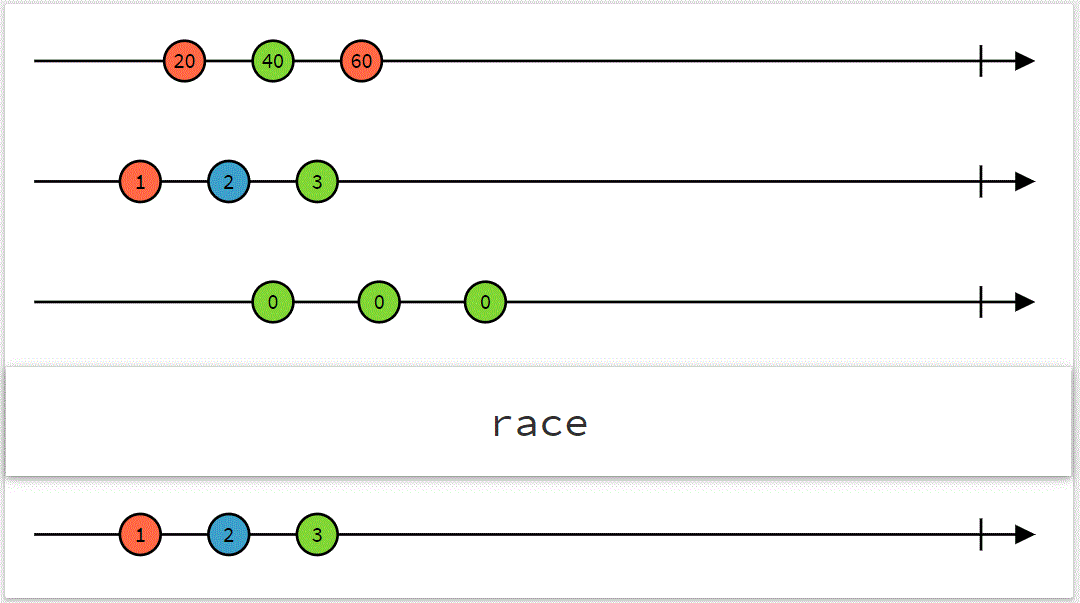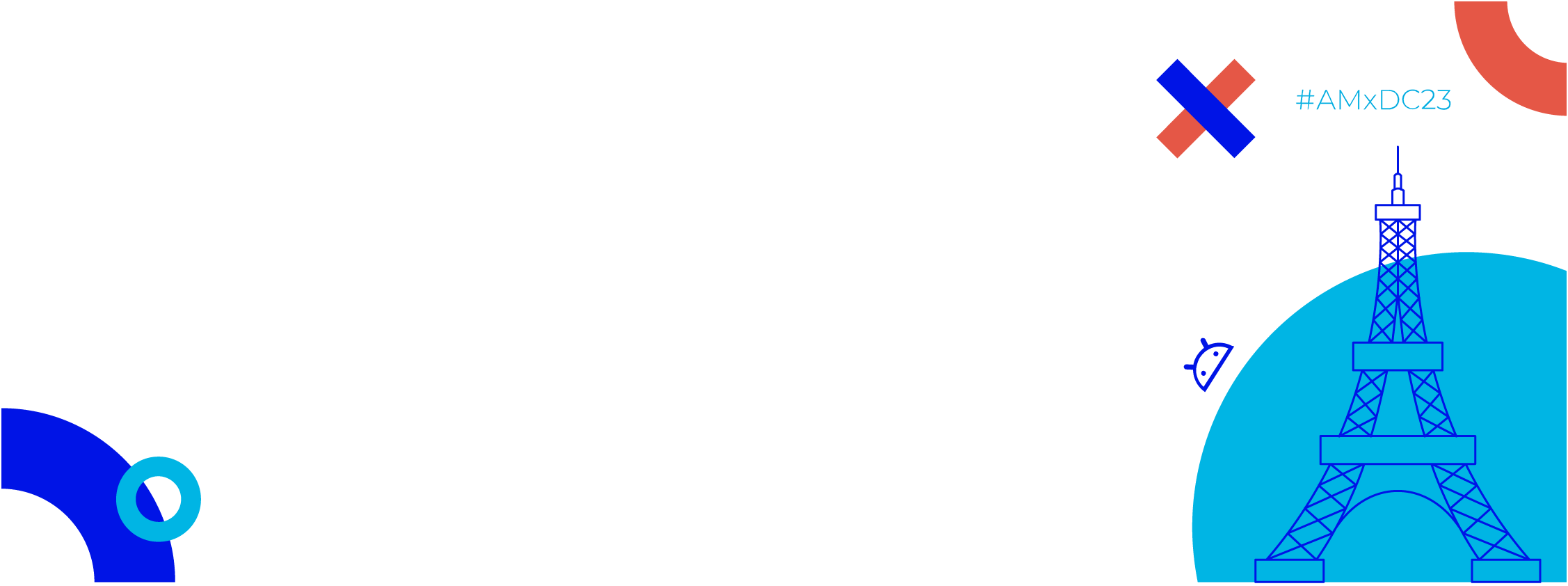Hello Kotlin Developers, let’s implement race/amb operator for Flow. This operator is similar to race of rxjs or amb of RxJava. You can check the documents below for more details.
race is used when we have multiple Flow s, we collect all of them, as soon as one of Flow emits a value/error/complete, it becomes the “winner”, others are canceled and the result Flow will forward all events (including error and complete events) from the “winner”.
 race (source: https://rxjs.dev/api/index/function/race)
race (source: https://rxjs.dev/api/index/function/race)
https://rxjs.dev/api/index/function/race
Returns an observable that mirrors the first source observable to emit an item.
https://reactivex.io/documentation/operators/amb.html
When you pass a number of source Observables to Amb, it will pass through the emissions and notifications of exactly one of these Observables: the first one that sends a notification to Amb, either by emitting an item or sending an
onErrororonCompletednotification. Amb will ignore and discard the emissions and notifications of all of the other source Observables.
Use and example
This operator is useful when you have multiple resources that provide values, for example, API resources but due to network conditions, the latency is unpredictable and varies significantly. In this case, we want to get the “fastest” value and ignore the “slower” values.
Here is an example:
| @ExperimentalCoroutinesApi | |
| public fun <T> race(flows: Iterable<Flow<T>>): Flow<T> = TODO("Will implement") | |
| fun firstSource(): Flow<String> = flow { | |
| delay(400) | |
| repeat(10) { | |
| emit("[1] - $it") | |
| delay(100) | |
| } | |
| } | |
| fun secondSource(): Flow<String> = flow { | |
| delay(100) | |
| repeat(10) { | |
| emit("[2] - $it") | |
| delay(100) | |
| } | |
| } | |
| fun thirdSource(): Flow<String> = flow { | |
| delay(500) | |
| repeat(10) { | |
| emit("[3] - $it") | |
| delay(100) | |
| } | |
| } | |
| suspend fun main() { | |
| race( | |
| firstSource(), | |
| secondSource(), | |
| thirdSource() | |
| ).collect { println(it) } | |
| // CONSOLE | |
| // [2] - 0 | |
| // [2] - 1 | |
| // [2] - 2 | |
| // [2] - 3 | |
| // [2] - 4 | |
| // [2] - 5 | |
| // [2] - 6 | |
| // [2] - 7 | |
| // [2] - 8 | |
| // [2] - 9 | |
| } |
Only values from the second Flow are emitted since it starts emitting first.
Implementation
race works in the following way:
- Collect to all source
Flows - When a new event arrives from a source
Flow, pass it down to a collector. - Cancel all other
Flows. - Forward all events from the winner
Flow.
Here is the implementation of race
| import kotlinx.coroutines.ExperimentalCoroutinesApi | |
| import kotlinx.coroutines.channels.ChannelResult | |
| import kotlinx.coroutines.channels.onFailure | |
| import kotlinx.coroutines.channels.onSuccess | |
| import kotlinx.coroutines.channels.produce | |
| import kotlinx.coroutines.coroutineScope | |
| import kotlinx.coroutines.flow.Flow | |
| import kotlinx.coroutines.flow.emitAll | |
| import kotlinx.coroutines.flow.flow | |
| import kotlinx.coroutines.selects.select | |
| import kotlinx.coroutines.yield | |
| @ExperimentalCoroutinesApi | |
| public fun <T> race(flows: Iterable<Flow<T>>): Flow<T> = flow { | |
| coroutineScope { | |
| // 1. Collect to all source Flows | |
| val channels = flows.map { flow -> | |
| // Produce the values using the default (rendezvous) channel | |
| produce { | |
| flow.collect { | |
| send(it) | |
| yield() // Emulate fairness, giving each flow chance to emit | |
| } | |
| } | |
| } | |
| // If channels List is empty, just return and complete result Flow. | |
| if (channels.isEmpty()) { | |
| return@coroutineScope | |
| } | |
| // If channels List has single element, just forward all events from it. | |
| channels | |
| .singleOrNull() | |
| ?.let { return@coroutineScope emitAll(it) } | |
| // 2. When a new event arrives from a source Flow, pass it down to a collector. | |
| // Select expression makes it possible to await multiple suspending functions simultaneously | |
| // and select the first one that becomes available. | |
| val (winnerIndex, winnerResult) = select<Pair<Int, ChannelResult<T>>> { | |
| channels.forEachIndexed { index, channel -> | |
| channel.onReceiveCatching { | |
| index to it | |
| } | |
| } | |
| } | |
| // 3. Cancel all other Flows. | |
| channels.forEachIndexed { index, channel -> | |
| if (index != winnerIndex) { | |
| channel.cancel() | |
| } | |
| } | |
| // 4. Forward all events from the winner Flow . | |
| winnerResult | |
| .onSuccess { | |
| emit(it) | |
| emitAll(channels[winnerIndex]) | |
| } | |
| .onFailure { | |
| it?.let { throw it } | |
| } | |
| } | |
| } |
By using “select expression”, we can select the first event that becomes available from Channels (https://kotlinlang.org/docs/select-expression.html#selecting-from-channels).
Bonus, we can add a variant function that accepts variable arguments and raceWith as an extension function on Flow
| @ExperimentalCoroutinesApi | |
| public fun <T> race(flow1: Flow<T>, flow2: Flow<T>, vararg flows: Flow<T>): Flow<T> = | |
| race( | |
| buildList(capacity = 2 + flows.size) { | |
| add(flow1) | |
| add(flow2) | |
| addAll(flows) | |
| } | |
| ) | |
| @ExperimentalCoroutinesApi | |
| public fun <T> Flow<T>.raceWith(flow: Flow<T>, vararg flows: Flow<T>): Flow<T> = race( | |
| buildList(capacity = 2 + flows.size) { | |
| add(this@raceWith) | |
| add(flow) | |
| addAll(flows) | |
| } | |
| ) |
Job Offers
Conclusion
We have already implemented race operator. Using Channel and “select expression” make the backpressure and concurrency problem a lot easier.
You can find full implementation and others Flow operators here https://github.com/hoc081098/FlowExt, with the entire source code, the documentation, and setup info to add the library to your project.
FlowExt is a Kotlin Multiplatform library, that provides many operators and extensions to Kotlin Coroutines Flow.
concatintervalneverFlowracerangetimerbufferCountconcatWithstartWithflatMapFirstexhaustMapflattenFirstexhaustAllmapIndexedmapTomapToUnitmaterializedematerializeretryWhenWithDelayStrategyretryWhenWithExponentialBackoffretryWithExponentialBackofftakeUntilthrottlethrottleTimewithLatestFrom- …
Thanks for reading ❤. If you like my article, please follow me on Medium, Github and Twitter.
This article was originally published on proandroiddev.com on March 24, 2022









